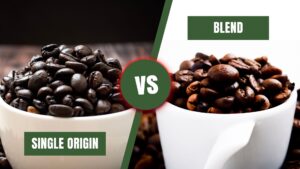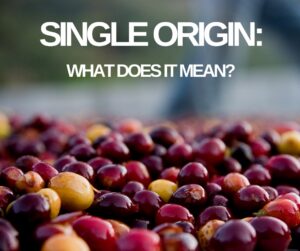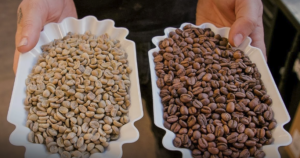Single Origin Better Than Blends

Single Origin Better Than Blends
Main Contents
- A. Intro to Single Origins
- B. Defining ‘Single Origin’ in the Coffee World
- C. Exploring the Link Between ‘Specialty’ and ‘Single Origin’
- D. Enhancing the Coffee Experience with Specialty Single Origins
- E. Redefining the Role of Specialty Coffee Blends
- F. Valuing Consistency with Coffee Blend
Single Origin Better Than Blends

A. Intro to Single Origins
In the vibrant world of third wave coffee establishments, it’s a common sight to find at least one single origin coffee offered, prepared as either espresso or filter brew.
These coffees vividly express the unique terroir and intrinsic qualities of their source.
The last decade has seen the specialty coffee community’s fascination with single origin coffees intensify. These coffees are not just prized for their quality but also for the values of transparency and traceability they embody. Consumers are increasingly drawn to coffees that come with a narrative, a glimpse into their origin’s essence and journey.
But with the rise in coffee prices, roasters are pivoting towards blends as a strategy for more economical cost management.
It begs the question: Do single origin coffees retain their edge in popularity among specialty coffee aficionados?
If so, they must genuinely offer a superior experience compared to blends.

B. Defining ‘Single Origin’ in the Coffee World
The term ‘single origin’ in the realm of specialty coffee broadly implies that the coffee is sourced from a singular geographic location. The scope of ‘single origin’ can vary widely, encompassing:
- An entire country or specific region within that country
- A single farm or estate, which may oversee multiple properties
- An individual plot within a farm, referred to as micro-lots or nano-lots based on size
These coffees are often celebrated for their distinct flavour profiles, which are deeply indicative of the terroir of their growing area.
This refers to the environmental factors that influence a crop’s characteristics, including:
Elevation, soil properties and makeup, weather patterns, local flora and fauna.
Unlike blends that combine beans from various origins, single origin coffees can be readily traced to a specific country, region, farm, or plot of land.
Roasters also provides details on their coffees, such as altitude, varietal, processing technique and roast profile.

C. Exploring the Link Between ‘Specialty’ and ‘Single Origin’
Specialty coffee, has become synonymous with single origin due to its association with superior quality for several reasons.
This concept emerged prominently during the third wave coffee movement in the mid-to-late 2000s when the focus on quality and traceability surged for both roasters and consumers.

D. Enhancing the Coffee Experience with Specialty Single Origins
As the specialty coffee audience has show a readiness to consume premium single origin coffees that promise superior quality.
It’s a path they come to value deeply once they’ve had a taste.
This experience not only lets consumers savour a coffee’s full flavour spectrum with unique and intriguing sensory profiles, but it also enriches their understanding of the coffee’s provenance and the intricacies of its production. This knowledge infuses additional worth into their coffee-drinking experience.

E. Redefining the Role of Specialty Coffee Blends
While single origin coffees have certainly catalysed a movement towards elevating coffee quality, the significance of specialty coffee blends should not be underestimated.
Using single origins as blends have been foundational, crafted from a mix of at least two distinct coffee origins. These blends can be diverse, comprising:
- Different countries, such as a mix of Brazilian and Kenyan beans
- Various regions or producers within a single country
- A range of varieties or processing methods from a single farm.
Traditionally, blends have suffered a reputation of being inferior to single origin coffees, often rightly so when the combined flavours clash or when the beans’ solubility levels mismatch, leading to inconsistent extraction.
Moreover some commercial roasters have blended higher-grade arabica with less expensive robusta to maintain cost-effectiveness, further contributing to the perception of blends as being of lower quality.

F. Valuing Consistency with Coffee Blend
Blends are offer as a more cost-effective option, therefore it play a crucial role in ensuring customers can enjoy a consistent cup of coffee.
Whether single origin coffees surpass blends in quality is challenging to address definitively. The determination is inherently subjective, varying with each individual’s palate, rendering a universal verdict unattainable.
It’s essential to recognise that both single origins and blends possess tremendous potential to deliver quality experiences. Both can exist side by side, complementing each other within the diverse tapestry of coffee culture.
Always remember, choose premium single origins from a reliable artisan roastery to create your specialty blends and this will ensure maintaining high quality flavours results.
It’s time for you to brew some Specialty Coffee.
Try our coffees
Every few months we sourced from different countries to select the best farm coffees harvest. We gently micro-batch drum roast all of our coffee beans in our roastery in Singapore. Indulge yourself in our flavourful coffees!
Get our fresh roast coffee beans on-demand from our Lazada and Shopee stores:
Lazada.sg/shop/soji-coffee/
Shopee.sg/soji.coffee
Or visit our shop at : 38A Beo Crescent Market #01-52 Singapore 169982 (Opening Hours > Click Here < )
-
Product on sale
![[Sample 1] COLOMBIA PINK BOURBON (Fruity)](https://soji.coffee/wp-content/uploads/2026/01/SAMPLE-1-Colombia-Pink-Bourbon-500x500.jpg) [Sample 1] COLOMBIA PINK BOURBON (Fruity)SGD Original price was: $8.90.$0.00Current price is: $0.00.
[Sample 1] COLOMBIA PINK BOURBON (Fruity)SGD Original price was: $8.90.$0.00Current price is: $0.00. -
Product on sale
![[Sample 2] ETHIOPIA YIRGACHEFFE G1 (Fruity)](https://soji.coffee/wp-content/uploads/2026/01/SAMPLE-2-Ethiopia-Yirgacheffe-500x500.jpg) [Sample 2] ETHIOPIA YIRGACHEFFE G1 (Fruity)SGD Original price was: $7.90.$0.00Current price is: $0.00.
[Sample 2] ETHIOPIA YIRGACHEFFE G1 (Fruity)SGD Original price was: $7.90.$0.00Current price is: $0.00. -
Product on sale
![[Sample 3] KENYA MBOGO (Balanced)](https://soji.coffee/wp-content/uploads/2026/01/SAMPLE-3-Kenya-Mbogo-500x500.jpg) [Sample 3] KENYA MBOGO (Balanced)SGD Original price was: $7.90.$0.00Current price is: $0.00.
[Sample 3] KENYA MBOGO (Balanced)SGD Original price was: $7.90.$0.00Current price is: $0.00. -
Product on sale
![[Sample 6] PAPUA NEW GUINEA AA SIGRI (Espresso)](https://soji.coffee/wp-content/uploads/2026/01/SAMPLE-6-PNG-Sigri-AA-500x500.jpg) [Sample 6] PAPUA NEW GUINEA AA SIGRI (Espresso)SGD Original price was: $5.90.$0.00Current price is: $0.00.
[Sample 6] PAPUA NEW GUINEA AA SIGRI (Espresso)SGD Original price was: $5.90.$0.00Current price is: $0.00. -
Product on sale
![[Sample 5] BRAZIL SUL DE MINAS (Espresso)](https://soji.coffee/wp-content/uploads/2026/01/SAMPLE-5-Brazil-Minas-500x500.jpg) [Sample 5] BRAZIL SUL DE MINAS (Espresso)SGD Original price was: $5.90.$0.00Current price is: $0.00.
[Sample 5] BRAZIL SUL DE MINAS (Espresso)SGD Original price was: $5.90.$0.00Current price is: $0.00. -
Product on sale
![[Sample 4] HONDURAS MONTECILLOS SHG (Balanced)](https://soji.coffee/wp-content/uploads/2026/01/SAMPLE-4-Honduras-Monte-500x500.jpg) [Sample 4] HONDURAS MONTECILLOS SHG (Balanced)SGD Original price was: $7.90.$0.00Current price is: $0.00.
[Sample 4] HONDURAS MONTECILLOS SHG (Balanced)SGD Original price was: $7.90.$0.00Current price is: $0.00.

